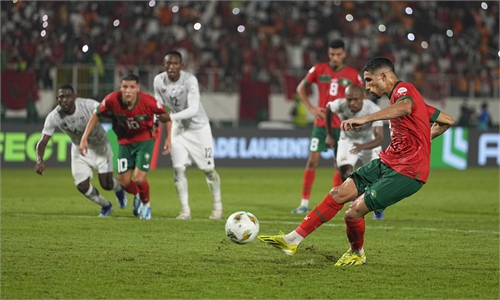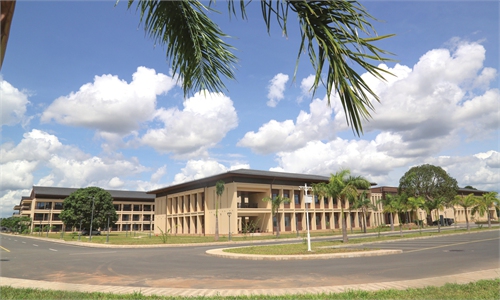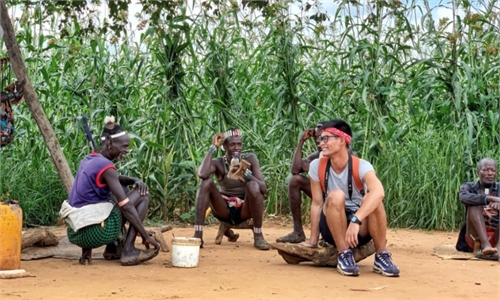IN-DEPTH / IN-DEPTH
Vigor and Vitality: Chinese youth think tank leader feels innovation, creativity, courage of African peers in exchange programs
Editor's Note:
The 2024 Forum on China-Africa Cooperation (FOCAC) Summit will be held in Beijing from September 4 to 6. The theme of this year's summit is "Joining Hands to Advance Modernization and Build a High-Level China-Africa Community with a Shared Future." In light of this, we are launching a series of China-Africa stories, including interviews with political leaders, stories of exchanges between young people from both regions, and intensive cooperation in various fields. Through these stories, we will see how China and Africa are deepening their ties and building a brighter future together.
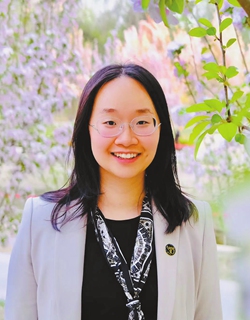
Li Ming, chairman of the China-Africa Youth Federation (CAYF) think tank, an international youth organization for Chinese and African Youth self-management and development, is a whirlwind of activity these days.
With the highly anticipated 2024 Summit of Forum on China-Africa Cooperation (FOCAC) on the horizon, she is deeply involved in organizing CAYF's various exchange programs, liaising with visiting African delegations, and hosting workshops for young professionals from both continents.
Simultaneously, as a PhD candidate at the China-Africa Institute, Li is meticulously crafting her dissertation on sustainable energy governance in African countries, focusing on Ethiopia and Kenya.
Li is well aware of the significance of this FOCAC. "Six years later, the FOCAC is once again being held in Beijing since 2018. The African youth and staff of the diplomatic missions working with us all have high expectations for the summit."
Li said she and her colleagues also hope to leverage the FOCAC to let more African friends come to China and see the new changes and progress that China has made in different aspects in the last six years.
Li's passion for Africa stems from a life-changing experience in 2017 during a Chinese Ministry of Commerce's training program, where, as a coordinator and translator for the African delegation, she interacted with numerous prominent African politicians and academics. Their genuine desire to learn from China's governance and development strategies deeply moved her.
This experience propelled Li from her original legal studies into the realm of African studies, completely reshaping her career path.
After graduating, Li pursued a master's degree while working as a translator for several African embassies in China. In 2020, she joined the CAYF, immersing herself further in fostering China-Africa relations. Her work has taken her to South Africa for the 2023 BRICS Summit and on an exploratory mission to Ethiopia in 2023.
"South Africa embodies modernity, openness, and inclusiveness," Li said. "My time in Ethiopia sparked a profound sense of resonance, with numerous China-funded projects, like the Addis Ababa-Djibouti Railway, and Chinese restaurants and hotels dotting the landscape," she recalled. "Although they are not as modern as China's mega-cities, the country as a whole shows a vitality of people, just like my country."
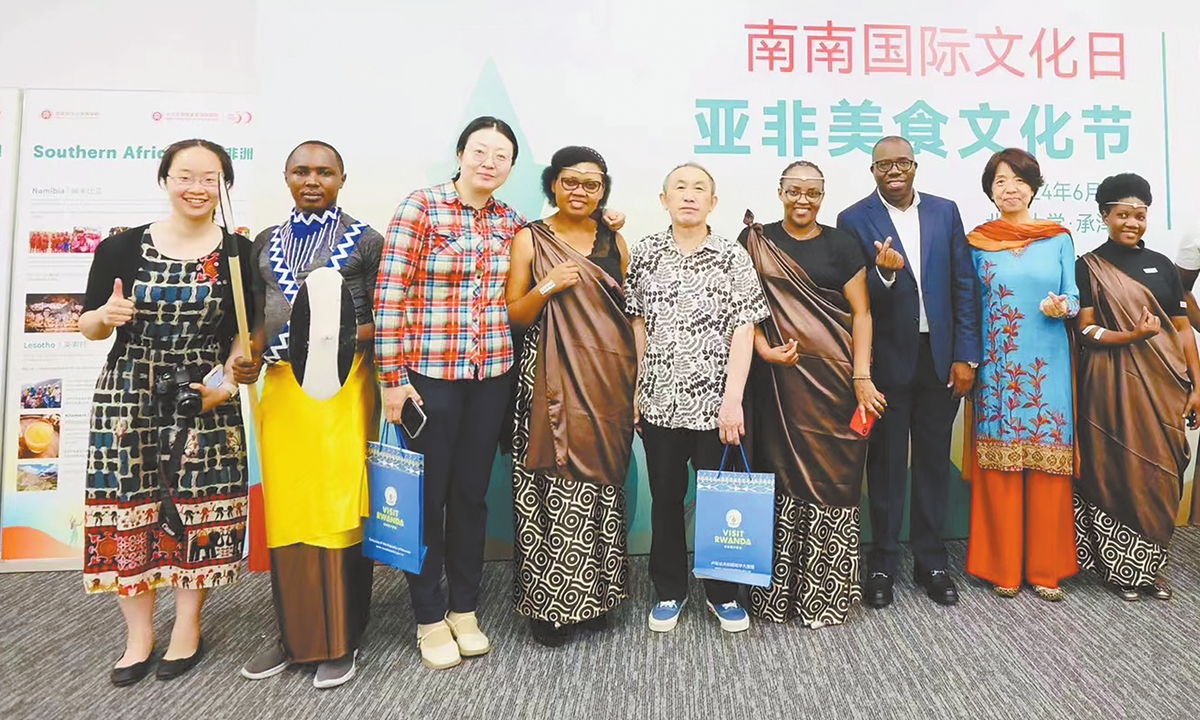
Based on her experiences, Li believes Africa is a diverse, vibrant continent brimming with its own unique wisdom. "The young Africans I interact with - largely students studying in China - are brimming with innovation, creativity, and courage, driven to realize their African dreams," she said.
Li noted that these young Africans are particularly interested in China's development model, aspiring to apply the knowledge gained in China to their own nations.
"They are eager to learn from China's approach, distinct from Western models, aiming to forge a path toward modernization and progress suitable for developing countries," Li said.
A recent heartwarming moment for Li was during the "Africa Day" event organized by the African student associations at Tsinghua and Peking universities in May, where young students from different African countries dressed in their unique costumes and showcased their cultures.
"I was struck by the vibrant and innovative ways, in which African youth showed the charm of their countries, and also shared their connection with China," Li said.
Through these interactions, Li witnesses the profound impact of China-Africa collaboration.
Both Chinese and Africans can feel that China is willing to embrace the world in a more open and inclusive way, rather than opting for so-called decoupling, confrontation, or alliances, Li said. "China consistently views its relationship with Africa through the lens of a community of shared future," she emphasized.
Born in 1995, Li noted that for Generation Z, "we have grown up witnessing the explosion of technologies like the internet, digital economies, renewable energy, and AI. We are both users and witnesses to this technological revolution," Li pointed out, nothing that fostering communication and collaboration between professionals in these fields across China and Africa is a priority for her going forward.
Li believed that this focus can play a good supplementary role to the traditional cooperation between China and African countries in infrastructure, trade, and investment, and other fields.
"We, compared with previous generations, can gain a much deeper understanding of each other's cultural backgrounds and the essence of our civilizations. I hope to infuse more fresh perspectives and youthful energy into China-Africa cooperation mechanisms, ensuring its continued vitality for generations to come," she said.
The 2024 Forum on China-Africa Cooperation (FOCAC) Summit will be held in Beijing from September 4 to 6. The theme of this year's summit is "Joining Hands to Advance Modernization and Build a High-Level China-Africa Community with a Shared Future." In light of this, we are launching a series of China-Africa stories, including interviews with political leaders, stories of exchanges between young people from both regions, and intensive cooperation in various fields. Through these stories, we will see how China and Africa are deepening their ties and building a brighter future together.

Li Ming, chairman of the Think Tank of the China-Africa Youth Federation (CAYF), attends an event at the Embassy of Rwanda in Beijing on April 7, 2024. Photo: Courtesy of Li
Li Ming, chairman of the China-Africa Youth Federation (CAYF) think tank, an international youth organization for Chinese and African Youth self-management and development, is a whirlwind of activity these days.
With the highly anticipated 2024 Summit of Forum on China-Africa Cooperation (FOCAC) on the horizon, she is deeply involved in organizing CAYF's various exchange programs, liaising with visiting African delegations, and hosting workshops for young professionals from both continents.
Simultaneously, as a PhD candidate at the China-Africa Institute, Li is meticulously crafting her dissertation on sustainable energy governance in African countries, focusing on Ethiopia and Kenya.
Li is well aware of the significance of this FOCAC. "Six years later, the FOCAC is once again being held in Beijing since 2018. The African youth and staff of the diplomatic missions working with us all have high expectations for the summit."
Li said she and her colleagues also hope to leverage the FOCAC to let more African friends come to China and see the new changes and progress that China has made in different aspects in the last six years.
Li's passion for Africa stems from a life-changing experience in 2017 during a Chinese Ministry of Commerce's training program, where, as a coordinator and translator for the African delegation, she interacted with numerous prominent African politicians and academics. Their genuine desire to learn from China's governance and development strategies deeply moved her.
This experience propelled Li from her original legal studies into the realm of African studies, completely reshaping her career path.
After graduating, Li pursued a master's degree while working as a translator for several African embassies in China. In 2020, she joined the CAYF, immersing herself further in fostering China-Africa relations. Her work has taken her to South Africa for the 2023 BRICS Summit and on an exploratory mission to Ethiopia in 2023.
"South Africa embodies modernity, openness, and inclusiveness," Li said. "My time in Ethiopia sparked a profound sense of resonance, with numerous China-funded projects, like the Addis Ababa-Djibouti Railway, and Chinese restaurants and hotels dotting the landscape," she recalled. "Although they are not as modern as China's mega-cities, the country as a whole shows a vitality of people, just like my country."

Li Ming attends the African and Asian Food Culture Festival at Peking University in Beijing on June 8, 2024. Photo: Courtesy of Li
Based on her experiences, Li believes Africa is a diverse, vibrant continent brimming with its own unique wisdom. "The young Africans I interact with - largely students studying in China - are brimming with innovation, creativity, and courage, driven to realize their African dreams," she said.
Li noted that these young Africans are particularly interested in China's development model, aspiring to apply the knowledge gained in China to their own nations.
"They are eager to learn from China's approach, distinct from Western models, aiming to forge a path toward modernization and progress suitable for developing countries," Li said.
A recent heartwarming moment for Li was during the "Africa Day" event organized by the African student associations at Tsinghua and Peking universities in May, where young students from different African countries dressed in their unique costumes and showcased their cultures.
"I was struck by the vibrant and innovative ways, in which African youth showed the charm of their countries, and also shared their connection with China," Li said.
Through these interactions, Li witnesses the profound impact of China-Africa collaboration.
Both Chinese and Africans can feel that China is willing to embrace the world in a more open and inclusive way, rather than opting for so-called decoupling, confrontation, or alliances, Li said. "China consistently views its relationship with Africa through the lens of a community of shared future," she emphasized.
Born in 1995, Li noted that for Generation Z, "we have grown up witnessing the explosion of technologies like the internet, digital economies, renewable energy, and AI. We are both users and witnesses to this technological revolution," Li pointed out, nothing that fostering communication and collaboration between professionals in these fields across China and Africa is a priority for her going forward.
Li believed that this focus can play a good supplementary role to the traditional cooperation between China and African countries in infrastructure, trade, and investment, and other fields.
"We, compared with previous generations, can gain a much deeper understanding of each other's cultural backgrounds and the essence of our civilizations. I hope to infuse more fresh perspectives and youthful energy into China-Africa cooperation mechanisms, ensuring its continued vitality for generations to come," she said.
